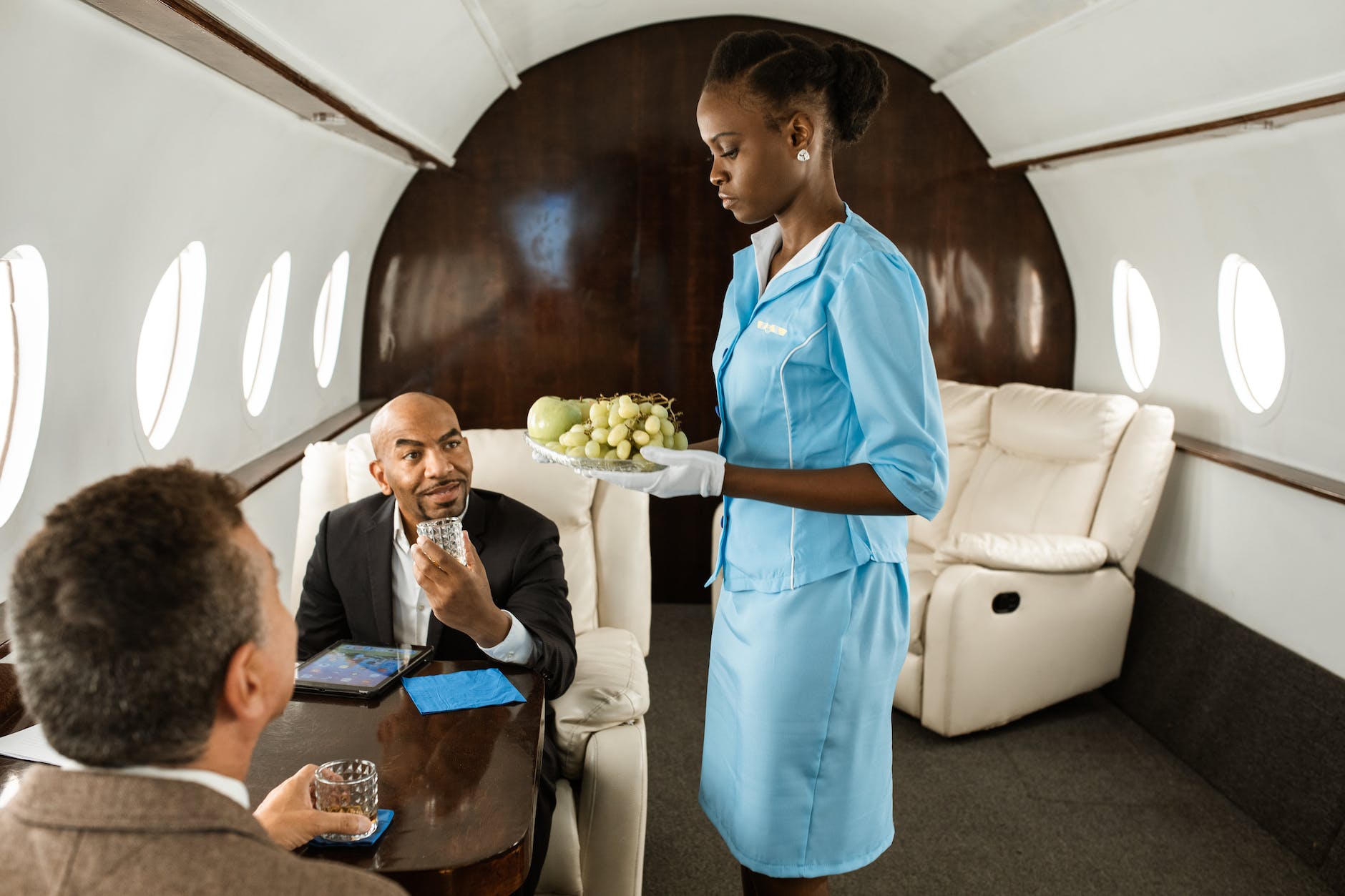日本文が後ろに続きます。
I have long been fond of airline flight attendants not only because of their charming appearance and graceful behavior on board but also because of their professionalism as security personnel who protect the cabin and passengers during emergencies. Their dignified appearance, backed up by their readiness to risk their lives to fulfill their duties in times of emergency, fascinates me.
Aspiring candidates must undergo months of rigorous training after joining an airline to become a flight attendant. During each part of the training, which includes training in emergency behavior, they must take several tests to ensure that they have mastered the skills required in each course and pass all of them. Even after becoming a flight attendant, they must undergo recurrent training, including emergency training, once a year to maintain their skills. They are suspended from flight service for a certain period if they fail.
Flight attendants, who have overcome such difficulties, are different from the average waitpersons who solely serve food and drinks in a restaurant, and they fascinate us with unparalleled professionalism. They demonstrated their professionalism to the fullest when the Japan Airlines Flight 516 was involved in an accident on January 2. When the Airbus A350 aircraft went up in flames after colliding with a Japan Coast Guard Dash-8 aircraft on the runway at Tokyo’s Haneda Airport, 12 JAL crew members calmly calmed the 367 panicked passengers as they saw the burning exterior and smoke entering the cabin, assessed where the doors safest to evacuate were, opened the doors and developed the emergency escape chutes according to the predetermined procedure, gave precise instructions to the passengers on how to escape, and helped all of them make it out alive. The crew evacuated after checking inside the burning cabin, ensuring that none of the passengers were left behind. Their selfless airmanship was impeccable.
The fact that all of the JAL passengers and crew survived the accident was due not only to the flight crew’s professionalism. The passengers’ high level of discipline also helped this miracle. None of the passengers acted selfishly, ignoring the cabin attendant’s instructions. They gave up their carry-on baggage, which included toiletries, car and house keys, laptops, tablets, expensive cameras, and New Year’s otoshidama from relatives. Although it must have been a wrenching pain for them, it was unavoidable for the safety of all passengers.
Air travel is a privilege allowed only to those who can share responsibility for safety with crew members and passengers with high ethical awareness. As passengers on board an aircraft, you may want to remember to respect the flight attendants in charge of security and help them facilitate their duties. You may want to check your baggage as much as possible to minimize carry-on baggage to conserve overhead bin space. If you have carry-on items that are small enough to put under the front seat, you may want to do that rather than put them in the overhead bin to give up space for more oversized baggage. If you have large and heavy baggage, you may want to put it in the overhead bin yourself rather than make a cabin attendant do so.
When sitting, you should permanently fasten the seat belt and turn off or set all your electronic devices to airplane mode. Keep your shoes on and stay awake when taking off and landing to be ready to take action quickly should any emergency occur. It would be desirable to wear pants with pockets to keep valuables inside in case of evacuating without having any bags. In colder months, wearing a coat is a good idea to increase the room for putting things inside.
When a cabin attendant serves or lowers your in-flight meal or drink, it is a good idea to say “thank you” to her, looking her in the eye and smiling. The thank-you word will boost her morale. If you have to ask a question or even make a complaint, you should do so in a gentlemanly and calm fashion. When disembarking after landing, saying “thank you” with the utmost gratitude to the cabin crew who stand and see you off is desirable. Especially if you are getting off a delayed flight that forces them to work late at night, the word of thanks to them will be most comforting. They are busy from start to finish. You may want to be considerate to them, though it’s true for everyone, and to help them fulfill their duties. You should strictly refrain from stopping a busy cabin attendant and forcing her to write your logbooks.
Again, the flight attendant is the security personnel responsible for the safety of the passengers. Whosoever annoys her, whosoever looks down on her, whosoever looks on her to lust after her, whosoever yells at her, whosoever touches her body or otherwise molests her is not fit to be on an airplane and should immediately get off board and use transportation appropriate to status.
An airplane cabin is a solemn salon reserved solely for humble and modest passengers. Only those ladies and gentlemen deserve the smiles of the “angels on board.” Passengers’ continuous awareness is required to keep their smiles.
ずっと、私はエアラインの客室乗務員(CA)が大好きです。それは彼女たちが容姿端麗で機内での振る舞いが優美だからというだけではなく、彼女たちが緊急時に機内と乗客を守る保安要員でもあるというそのプロ意識に惹かれるからでもあります。彼女たちの凛としたたたずまいに裏打ちされた、いったんことあれば命をかけて職務を全うする姿勢に、魅了されるのです。
CAになるためには、航空会社に入社後、数ヶ月に及ぶ厳しい訓練を受けなければなりません。緊急時の行動訓練など訓練の各パートでは、各課程で必要な技量を身につけているかどうか何度もテストされ、そのすべてに合格することが求められます。晴れてCAになってからも、技量維持のため年一回、緊急時訓練を含むリカレント訓練を受けなければなりません。不合格になると一定期間、乗務停止となってしまいます。
そんな困難を乗り越えてきたCAたちは、レストランで食事や飲み物を提供するだけのそこらへんのウェイトレスとは違い、比類なきプロフェッショナリズムで私たちを魅了してくれます。そのプロフェッショナリズムがいかんなく発揮されたのが、2日のJAL516便の事故です。羽田空港の滑走路で日本航空のエアバスA350型機が海上保安庁のダッシュ8型機と衝突して炎上した際、12人のJAL乗務員は、燃えている外装や機内に入ってくる煙を見てパニックになった367人の乗客を冷静に落ち着かせ、最も安全に避難できるドアがどこかを見極め、決められた手順でドアを開けて緊急脱出用シューターを展開し、乗客に脱出方法を的確に指示し、全員を生きて脱出させました。さらに乗員は燃え盛る機内を確認し、乗客が一人も取り残されていないことを確認したあとで避難したのです。クルーたちの無私のエアマンシップは非の打ちどころがないものでした。
JALの乗客乗員がみな生還できたのは、フライトクルーのプロ意識によるものだけではありません。乗客の高い規律もこの奇跡を支えたのです。CAの指示を無視して自分勝手に行動した乗客は一人もいませんでした。乗客は洗面用具、車や家の鍵、ノートパソコン、タブレット端末、高価なカメラ、親戚からもらった正月のお年玉などが入っていた手荷物を諦めました。それは身を引き裂かれるような辛さだったに違いないでしょうが、乗客全員の安全のためにはやむを得ないことでした。
空の旅は、クルーと乗客とが高い倫理観をもって安全に対する責任を共有できる者だけに許された特権だと思います。機内の乗客としては、保安を担当するCAへの敬意を忘れず、彼女たちの任務の円滑な遂行に協力したいものです。頭上の荷物入れのスペースを節約するため、手荷物はできるだけ預け、機内持ち込み手荷物は最小限にしたいものです。手荷物がある場合は、前の座席の下に入れられるサイズなら、頭上の荷物入れではなく座席下に押し込むようにしたいものです。大きくて重い荷物がある場合は、頭上の荷物入れにはキャビンアテンダントに頼んで入れてもらうのではなく、自分で入れるようにしたいものです。
座っているときは、シートベルトを必ず締め、電子機器の電源を切るか、機内モードに設定しましょう。離着陸の際は靴を履き、起きた状態で、緊急事態が発生した場合にすぐに対応できるようにしておきましょう。バッグを持たずに避難する場合に備えて、貴重品を入れておけるポケット付きのズボンを着用するのが望ましいでしょう。寒い季節には、中に物を入れるスペースを増やすためにコートを着るのもよいかもしれません。
CAが機内食や飲み物を出してくれたり下げてくれたりしたら、彼女の目を見つめてほほえみながら「ありがとうございます」と言うのがよいでしょう。感謝の言葉はCAの士気を高めてくれます。問い合わせをしたりする場合や、苦情を言わなければならない場合があったとしても、紳士的かつ冷静にすべきです。着陸後に降機するときは、立って見送ってくれるCAには最大限の感謝を込めて「お疲れ様でした」と言うのが望ましいでしょう。特に遅延便で、夜遅くまで乗務を強いられた便から降りるようなときは、彼女たちへのねぎらいの言葉が何よりの慰めになることでしょう。彼女たちは最初から最後まで忙しくしています。誰にでも言えることですが、彼女たちへの思いやりを持ち、職務を全うする手助けをしたいものです。忙しく立ち働くCAを呼び止めて自分のログブックを書かせるようなことは厳に慎むべきでしょう。
繰り返しになりますが、CAは乗客の安全を守る保安要員です。CAを困らせる者、CAを見下す者、CAを情欲をもって見る者、CAに怒鳴りつける者、CAの体に触れたりハラスメント行為をする者は、飛行機に乗る資格はないので直ちに降機し、身分相応の交通機関を利用すべきです。
飛行機のキャビンは、謙虚で慎み深い乗客だけに許された厳粛なサロンです。そのような紳士淑女だけが「機上の天使」のほほえみを受けるに値するのです。彼女たちの笑顔を絶やさないために、乗客は絶え間なく意識することが必要なのです。

Leave a Reply